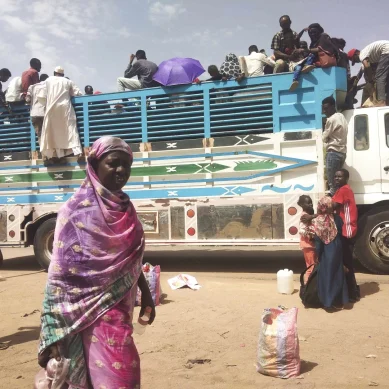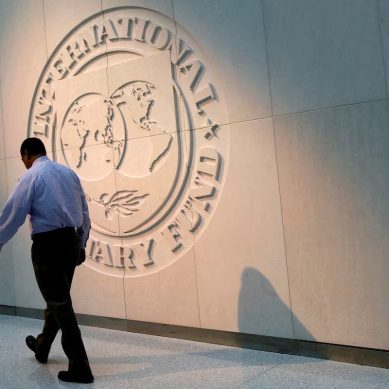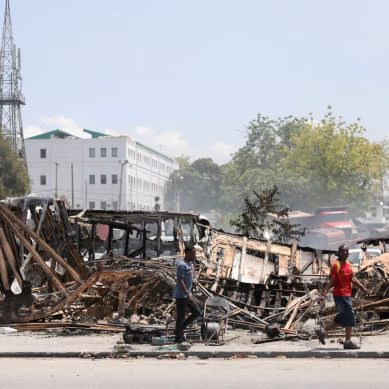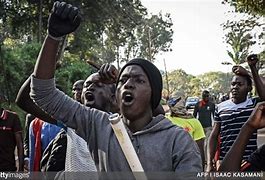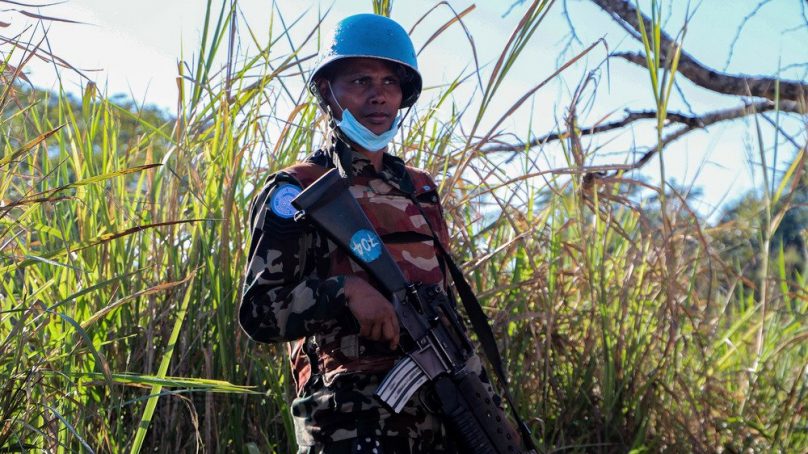
When she was just nine, Sara Nyatapa fled to a UN camp as South Sudanese government soldiers launched attacks against members of her community during the heat of the civil war.
Seven years later, the 16-year-old fears the past may repeat itself after peacekeepers transferred responsibility for protecting her camp to the same government forces, she ran from in 2014.
“If security is under government control, it won’t be okay,” Nyatapa told The New Humanitarian in December from a camp in Juba, South Sudan’s capital. “I’m worried that the same thing that happened in 2014 will happen again.”
After the civil war erupted in 2013, the UN peacekeeping mission in South Sudan, known as UNMISS, opened up its bases to more than 200,000 people – a move credited with saving tens of thousands of lives.
But defending the camps – known as Protection of Civilians (PoC) sites – tied up the resources of the mission over the years, according to UN officials, while South Sudan’s government saw them as a violation of its sovereignty.
UNMISS officials now claim the mission is no longer needed in the camps. Citing improved security following the signing of a peace deal in late 2018, and the formation of a unity government two years later, they have left five of the six sites so far.
The decision has left camp residents – who mostly belong to communities associated with opposition groups on account of their ethnicity – afraid of what might happen if conflict flares again; something few analysts rule out.
Though South Sudan’s main opposition leader and current Vice-President Riek Machar agreed to share power with President Salva Kiir last year, key parts of the peace agreement have not been implemented amid entrenched distrust between the two men.
Since the peacekeepers began withdrawing in September, sexual abuse and exploitation cases have risen in at least one camp, aid officials told The New Humanitarian, blaming some incidents on government soldiers.
Some 200,000 South Sudanese fled to UN-protected camps after civil war erupted in 2013. Peacekeepers are now withdrawing from the sites even as conflict continues across the country.
Meanwhile, South Sudanese police officials now responsible for protecting the camps say that residents have rejected their authority, and that the site in Juba where Nyatapa lives currently has no formal security at all.
Concerns are also growing over plans to hand over the sixth and most contentious camp, in the northern town of Malakal: Ethnic and political tensions are frequent in the area and have left residents of the site there fearing the worst.
“Government controlling the camp will be useless to me,” said Malakal camp resident Gideon Gok Bol. “[There’s] no good national army trained in South Sudan, just a tribal army.”
By opening bases to people fleeing violence, the UN sought to avoid past occasions when peacekeeping missions had failed to prevent mass killings, from the Rwandan genocide to the Bosnian war.
In an interview with The New Humanitarian in December when he was still head of UNMISS, David Shearer said a security assessment of the camps – which housed 125,000 people as of February – showed “no risk” in transferring them to the government.
By withdrawing UN personnel, Shearer said the mission would be able to boost its presence in other parts of the country where violence persists and people face more immediate risks.
“I can’t responsibly dedicate hundreds of police and military to protect places that don’t need protection when, in other places in the country, there are people who have no protection and who are being killed; women being raped, villages being burned,” Shearer said.
While several aid workers who spoke to The New Humanitarian agreed with the decision – viewing the sites as unsustainable in the long term – most camp residents distrust the government and fear a breakdown in the peace process could leave them exposed to new atrocities.
Tensions are particularly high in a camp recently handed over to authorities in the northern town of Bentiu, where civilians suffered “staggering” violence by government troops during the civil war, according to rights groups.
Community leaders from the camp are currently engaged in a war of words with the local governor – who has responsibility for security in the area – for giving government jobs to individuals who they say “committed atrocities and war crimes” against them.
Tensions are also expected at the camp in Malakal, though no timeline has been set for the handover there.
Mark Millar, a policy analyst for the Norwegian Refugee Council in South Sudan, said ethnic Shilluk living in the Malakal camp are at risk of being targeted by other groups once the UN withdraws.
“There has been a concerted effort to marginalise Shilluk influence on the [Nile’s] east bank [where Malakal is based] since 2013, to the point that the community in the site is the last remaining Shilluk community this side of the Nile,” Millar said. “The possibility that they would be targeted… is very high.”
Some camp residents said their trust in security forces would have been boosted if there had been progress in establishing a unified national army, combining opposition and government soldiers.
The new force is a central plank of the 2018 peace agreement, but timelines for its creation have slipped, as have other measures intended to reform the existing military.
“Civilians inside and outside [the camps] have expressed serious concerns about national security forces that have not undergone the security sector reform measures envisioned in the [peace agreement],” said Lauren Spink, a researcher at the Center for Civilians in Conflict think tank.
Incidents involving national security forces have already been reported in the camps since peacekeepers withdrew.
In March, government soldiers attempted to remove an aid worker’s trousers with a knife during one assault in the Bentiu site, according to an aid agency security report seen by The New Humanitarian.
Another aid official working in the camp in Juba said cases of rape and physical assault – not necessarily perpetrated by government troops – have increased from around one case per day before UNMISS withdrew to an average of three.
Police officers at the same Juba camp harassed, assaulted, and threatened to arrest a driver working with The New Humanitarian during a visit in December, according to an account from the driver, whose name is being held to protect their identity.
Government officials did not respond to requests for comment, but acting army spokesman Santo Domic Chol called camp residents “opposition sympathisers” who are “politicising the situation”. He said they have nothing to be afraid of.
- The New Humanitarian report
